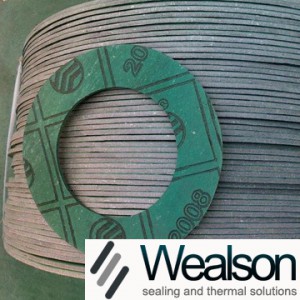
 Oil-Resisting Gasket
Oil-Resisting Gasket
There are many different kinds, and of course the best kind for your project depends entirely upon the application. Many of these gaskets are made of asbestos or rubber, so it is essential that you understand when asbestos gaskets are OK to use and when you simply need a rubber one. In most cases, you will want to use rubber rather than asbestos, which has been shown to cause cancer when inhaled.
Usually oil resistant gaskets are cut from larger sheets of the material. They can be cut to any size, so what you are really looking for when selecting the right one is a list of properties of the material. There are several kinds of rubber that have oil resistant properties, and each of these rubbers also have other characteristics that make it perfect for very specific uses in which oil resistance isn’t the only concern. Here are some of the most popular types of rubbers used:
![]() Neoprene – This type of rubber has an extremely dynamic response that is incredibly close to natural rubber. It probably offers the highest oil resistance of what’s out there. Also gaskets that are made of neoprene tend to age better and are not softened up by high heat levels. One downside is that the tensile strength is probably lower than that of some other types of oil resistant rubbers. Also this type of gasket doesn’t do particularly well in extremely low temperatures and tends to be rather expensive.
Neoprene – This type of rubber has an extremely dynamic response that is incredibly close to natural rubber. It probably offers the highest oil resistance of what’s out there. Also gaskets that are made of neoprene tend to age better and are not softened up by high heat levels. One downside is that the tensile strength is probably lower than that of some other types of oil resistant rubbers. Also this type of gasket doesn’t do particularly well in extremely low temperatures and tends to be rather expensive.
![]() Chlorosulfonated polyethylene – Probably best known by its brand name Hypalon, this type of synthetic rubber has oil resistant properties that are approaching those of neoprene. Oil resistant gaskets made from this type of rubber are very resistant to abrasion, oxidizing chemicals, heat, and weather. It also has low moisture absorption and can be made in different colors. It is not much better at low temperatures than neoprene is. This type of rubber is perfect for applications in which environmental resistance is a major issue.
Chlorosulfonated polyethylene – Probably best known by its brand name Hypalon, this type of synthetic rubber has oil resistant properties that are approaching those of neoprene. Oil resistant gaskets made from this type of rubber are very resistant to abrasion, oxidizing chemicals, heat, and weather. It also has low moisture absorption and can be made in different colors. It is not much better at low temperatures than neoprene is. This type of rubber is perfect for applications in which environmental resistance is a major issue.
![]() Ethylene / acrylic – This type of rubber is found very often in gaskets. It is unique because it stands up well to the combination of high heat, weatherization, and oil. It also works very well in low temperatures, unlike the first two types of rubber mentioned. However, it is not recommended for cases of high pressure steam or highly aromatic fluids.
Ethylene / acrylic – This type of rubber is found very often in gaskets. It is unique because it stands up well to the combination of high heat, weatherization, and oil. It also works very well in low temperatures, unlike the first two types of rubber mentioned. However, it is not recommended for cases of high pressure steam or highly aromatic fluids.
![]() Polysulfide – This type of rubber is extremely resistant to grease and oils, but it doesn’t smell very good. Also it isn’t very resilient and doesn’t tolerate high temperatures very well. This type of gasket is best used when it will remain immersed in oil because it retains some of the more important properties needed in gaskets.
Polysulfide – This type of rubber is extremely resistant to grease and oils, but it doesn’t smell very good. Also it isn’t very resilient and doesn’t tolerate high temperatures very well. This type of gasket is best used when it will remain immersed in oil because it retains some of the more important properties needed in gaskets.
![]() Silicone – This is one of the most common types of rubber, and as such, you will find many oil resistant gaskets that are made from it. One great benefit of opting for silicone is the fact that the price is a bit more stable than other rubbers because it does not depend as much on the current price of petroleum. They also stand up to high temperatures very well.
Silicone – This is one of the most common types of rubber, and as such, you will find many oil resistant gaskets that are made from it. One great benefit of opting for silicone is the fact that the price is a bit more stable than other rubbers because it does not depend as much on the current price of petroleum. They also stand up to high temperatures very well.
Of course there are many other materials that are commonly used to make oil resistant gaskets. It is essential that you have an expert help you determine which material is the right one for your specific application. No two oil resistant gaskets have the exact same set of properties, so you need someone who works with them on a daily basis.
